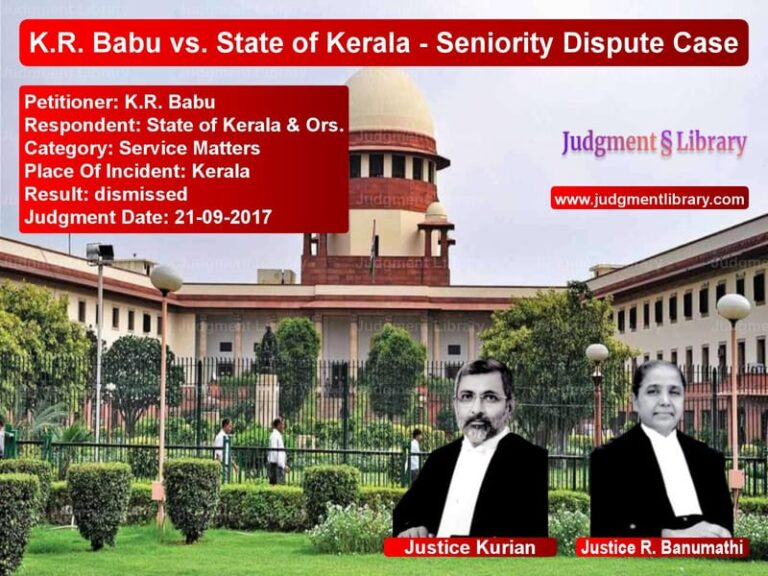Supreme Court Ruling on the Rights and Welfare of Widows in Vrindavan
The Supreme Court of India, in the case of Environment and Consumer Protection Foundation vs. Union of India & Ors., addressed the pressing issue of the living conditions and welfare of widows in Vrindavan and other ashrams across India. The case was initiated as a public interest litigation (PIL) to ensure that widows are treated with dignity and provided with adequate social welfare measures. The judgment is a significant milestone in recognizing the fundamental rights of widows and ensuring that they are not deprived of basic human dignity.
Background of the Case
The Environment and Consumer Protection Foundation, a registered charitable society, filed the PIL under Article 32 of the Constitution, seeking directions for the rehabilitation of widows in Vrindavan. The petition was based on a report published in The Times of India titled ‘White Shadows of Vrindavan,’ which highlighted the deplorable conditions in which widows were forced to live—begging in temples and surviving in unhygienic ashrams.
The article described the plight of widows who, after being abandoned by their families, congregated in Vrindavan to live a life of poverty and social neglect. Many of these women, mostly from West Bengal, spent their days singing bhajans in temples for meager earnings of Rs. 18 per day while relying on alms for survival.
Legal Issues
The Supreme Court examined the following issues:
- Whether the state and central governments had failed to provide adequate social welfare measures for widows.
- The constitutional rights of widows under Article 21 (Right to Life and Dignity).
- What directives should be issued to ensure better living conditions, employment opportunities, and financial security for widows.
Key Directives Issued by the Supreme Court
The Supreme Court recognized the urgency of the issue and passed multiple orders aimed at improving the conditions of widows in Vrindavan and across India. Some of the major directives included:
1. Identification and Documentation of Widows
The court directed the government to maintain a comprehensive database of widows residing in ashrams. The database was to be integrated with Aadhaar to track the status of each widow and ensure that they receive necessary benefits.
2. Family Counseling and Legal Aid
Recognizing that many widows were abandoned by their families, the court ordered family counseling centers to be set up under the Central Social Welfare Board (CSWB) and State Social Welfare Boards (SSWB). These centers were tasked with identifying widows with families and counseling their relatives to take them back.
The court also directed the National Legal Services Authority (NALSA) to provide legal aid to widows who faced property disputes, domestic violence, or any form of exploitation.
3. Skill Development and Employment Opportunities
One of the most crucial aspects of the judgment was the emphasis on economic independence for widows. The court directed the Ministry of Skill Development and Entrepreneurship to introduce vocational training programs, including:
- Tailoring
- Handicrafts
- Hospitality and caregiving
- Small-scale entrepreneurship
These programs were designed to provide widows with viable sources of income so that they do not have to rely on begging.
4. Financial and Medical Support
The court noted that pensions allocated to widows were inadequate and directed the government to revise pension amounts based on the Cost of Living Index. Additionally, it mandated free medical care for widows under the National Health Mission.
5. Construction and Maintenance of Shelters
The Supreme Court directed the central and state governments to improve the infrastructure of widow shelters and construct new Swadhar Grehs (government-funded homes for women in distress). A model 1,000-bed Swadhar Greh was planned in Vrindavan, with facilities such as:
- Physiotherapy units
- Community halls
- Solar water heating
- Recreational spaces
6. Encouraging Widow Remarriage
The court also discussed the need to change societal attitudes toward widows. It suggested that policies be introduced to encourage widow remarriage and remove the stigma associated with it.
Observations of the Supreme Court
The Supreme Court noted the following in its judgment:
“It is a pity that these widows have been so unfortunately dealt with, as if they have ceased to be entitled to live a life of dignity and as if they are not entitled to the protection of Article 21 of the Constitution.”
The Court also emphasized that providing for the welfare of widows is a constitutional duty of the state and that social justice cannot be ignored.
Conclusion
This judgment is a landmark decision in recognizing the rights of widows in India. The Supreme Court not only highlighted the failures of the state in providing adequate welfare measures but also laid down clear directives to ensure that widows are treated with dignity. By addressing financial security, healthcare, and employment opportunities, the judgment paves the way for a more inclusive society where widows are not marginalized.
Going forward, the success of this ruling will depend on the effective implementation of the court’s directives by the central and state governments. Continuous monitoring and public participation will be essential in ensuring that the rights of widows are upheld and that they are empowered to lead independent lives.
Don’t miss out on the full details! Download the complete judgment in PDF format below and gain valuable insights instantly!
Download Judgment: Environment and Cons vs Union of India & Ors Supreme Court of India Judgment Dated 11-08-2017.pdf
Direct Downlaod Judgment: Direct downlaod this Judgment
See all petitions in Consumer Rights
See all petitions in Public Interest Litigation
See all petitions in Contract Disputes
See all petitions in Judgment by Madan B. Lokur
See all petitions in Judgment by Deepak Gupta
See all petitions in allowed
See all petitions in Modified
See all petitions in supreme court of India judgments August 2017
See all petitions in 2017 judgments
See all posts in Civil Cases Category
See all allowed petitions in Civil Cases Category
See all Dismissed petitions in Civil Cases Category
See all partially allowed petitions in Civil Cases Category







